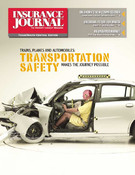VW Seeks a Sales Charge Out of No-Charge Insurance to Car Buyers
Volkswagen of America, looking for ways to attract younger buyers, is going beyond sporty designs, cash rebates and zero percent financing incentives to offer car buyers, regardless of their risk profile, auto insurance at no charge for one year.
While the plan is designed to attract younger drivers who are generally among an insurer’s higher risks, it is open to all buyers of selected models. VW is offering the incentive on a trial basis from Jan. 4 to March 31 in Illinois and Wisconsin to customers who purchase or lease the new 2004 and 2005 Golf, New Beetle and New Beetle Convertible.
To qualify residents need only be legally licensed in Illinois or Wisconsin and take delivery of a qualifying car from a VW dealer in those states.
The VW In the Car insurance policies are underwritten by Nationwide Mutual Fire Insurance Company (Illinois) and Nationwide Property Casualty Insurance Company (Wisconsin).
Volkswagen will pay the premiums for one year, after which the buyers must secure their own coverage. Nationwide hopes it can retain many of them as customers after the first year.
Creative Innovators, an insurance and financial services think-tank based in Bethpage, N.Y., designed the insurance model and worked with Volkswagen and Nationwide to develop the program. The pricing model bases risk on the car model rather than a driver’s profile. The only other rating variable is the state. In this respect, the model runs counter to the trend in the industry of increasing the number of variables and levels in pricing models.
Creative Innovators said its model anticipates a higher-than-normal ratio of younger, higher-risk drivers, but the firm maintained that it will also be attractive to a wide spectrum of customers, including parents with teenagers and urban residents who now pay some of the highest premiums.
“The VW In The Car insurance policies will be valuable to VW customers regardless of age, sex or any other rating measurement used in traditional insurance,” said Robert M. Wallach, Creative Innovators managing partner.
The VW pilot runs for 90 days, after which VW and Nationwide have 30 days to decide whether to continue it on an exclusive basis for one year.
Wallach has heard the doubters in insurance circles who believe the program is bound to cost the insurer so much money that it will fail but he is undeterred. “This will not fail,” he told Insurance Journal.
Wallach said that skeptical insurers become convinced it can work after he has had a chance to show them his “highly quantitative” model.
Since the franchising arrangement with VW and Nationwide was announced, three other major insurance carriers have signed on for future pilots, he maintained.
Car manufacturers have been offering up to $5,000 cash back, zero percent financing and various other incentives for buyers. But Wallach thinks the insurance angle could be more effective at increasing traffic in VW showrooms and boosting sales, particularly within the target youth market, for a number of reasons.
He cites statistics showing that 23 percent of consumers do not buy new cars because of the cost of insurance and that 15 percent of car buyers are new customers. “The cost of insurance is the second-largest expense in owning a car,” he said.
Unlike zero-percent financing programs, all buyers of the selected models can take advantage of the insurance incentive. Approximately 70 percent of new-car shoppers do not qualify for zero percent financing, according to Edmunds.com research.
Also, the insurance incentive will not diminish the car’s trade-in value the way that rebates do.
“Traditional customer cash incentives have the effect of accelerating depreciation; what a consumer gets in an upfront discount is taken away in part at trade-in time,” said Bob Kurilko, vice president for online car expert Edmunds.com.
“VW’s shift to a true added-value strategy, paying for a year’s insurance costs, gives the consumer more realized value without generating the downside of traditional incentive programs,” he added.
The VW In the Car program also simplifies the purchasing process. Dealers provide the customer’s name, address and driver’s license number, and within minutes the customer can drive away with a temporary insurance card. An insurance professional is scheduled to call the customer within three business days to explain the policy, confirm coverages and provide assistance.
According to Wallach, the car salespeople are not required to be licensed as insurance producers because they simply collect the name and address before connecting the buyer with a licensed call center insurance professional. Nationwide has outsourced this part of the process to an affiliate of Creative Innovators.
While skeptics have hinted that the insurance premium must be bundled into the price of the car, Wallach said this is not the case. The buyer is not told how much the premium is. VW just pays the premium from its incentive program budget.
Some have questioned whether the program could be a violation of anti-rebating laws since the car maker is paying the premium. But thus far the company has not encountered complaints.
Kathleen Hamilton, public relations manager for Creative Innovators, likens it to American Express offering insurance on goods purchased with their credit card or other credit card companies offering rental car coverage.
Wallach sees expansion down the road, with additional states, manufacturers and insurers. He does not expect regulatory roadblocks in most states. He said state regulators have welcomed the plan because it addresses the cost and availability of coverage for young and other higher risk drivers.
“The critics are completely wrong,” he said.
Was this article valuable?
Here are more articles you may enjoy.


 Trapped Tesla Driver’s 911 Call: ‘It’s on Fire. Help Please’
Trapped Tesla Driver’s 911 Call: ‘It’s on Fire. Help Please’  Zurich Reveals Beazley Stake After UK Insurer Spurns Bid
Zurich Reveals Beazley Stake After UK Insurer Spurns Bid  What Analysts Are Saying About the 2026 P/C Insurance Market
What Analysts Are Saying About the 2026 P/C Insurance Market  Winter Storm Fern to Cause Up to $6.7B in Insured Losses
Winter Storm Fern to Cause Up to $6.7B in Insured Losses 


